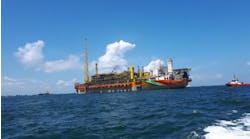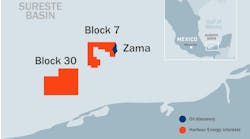WEST AFRICA: Nigerian production sharing contracts solve cash call problems
Production sharing contracts (PSC) have offered exploration and production companies and oil producing countries such as Nigeria a unique arrangement for the development of petroleum resources, particularly within the deepwater offshore area. The main features of a good PSC includes the following:
- Total control of petroleum resource retained by the host governments.
- Exploration risk borne by contractor (explor- ation and production firm provides expertise and financing).
- Development and production costs borne by the contractor.
Upon commercial production, oil produced is allocated in the following manner:
- Cost oil: Goes to the contractor's costs
- Royalty oil: Allocated for payment of royalty
- Tax oil: Allocated for payment of taxes
- Profit oil: PSC stipulates a sharing formula between the host government and the contractor.
Historically, the PSC arrangement evolved from Indonesia where it was successfully used as far back as in 1967. Nigeria's experience with the PSC arrangement started with Ash-land Oil Company now (Addax) in 1973 and has proven to be successful for the government, as well as foreign investors who are invariably the operators under the PSC arr-angements.
History
Prior to 1993, the predominant contract model for the purpose of exploration, development, and production of Nigerian oil resources was the joint venture arrangement, under which the Government of Nigeria, acting through the National Oil Company (NNPC), had to contribute substantial counterpart funding (cash calls) to meet equity participation in the joint ventures (JV), in which the government invariably had majority shares.
Consistent inability of the Nigerian government to adequately meet its obligations under the JV arrangements led it to explore other modes of developing the nation's vast oil resources (current reserves estimated at 25 billion bbl).
The PSC arrangement provided a ready solution for both government and the operators. While government no longer needs to meet its periodic cash call obligation to JV programs, the operators on the other hand readily embraced the varying degree of fiscal incentives and convenient work programs offered by the PSC law.
Prior to 1999, there was no specific legislation/enactment, which dealt with the Nigerian PSC arrangement. All that existed were agreements between NNPC and underlisted contracting companies regulations, pronouncements and official statements, which went to reinforce the applicability of the PSC arrangement.
This state of affairs provided the operators with problems, which were legal enforceability and difficulty in securing financing on the basis of mere agreements that were not backed by law.
The Deep Offshore and Inland Basin Prod-uction Sharing Contracts Decree No. 9 of 1999 as amended, referred to as the PSC law, finally came about after persistent pressure by affected operators, demanding a formal law to give legislative backing to fiscal incentives, as guaranteed by the government under the PSC arrangement.
PSC law
The PSC law amends both the general Petroleum Act 1969 (as amended) and the Petroleum Profit Tax Act (as amended). In general terms, the pre-existing petroleum laws are to be read in conformity with the PSC law. In other words, the PSC law prevails in the event of any inconsistency between the provision of the PSC law and any other pre-existing law (See Section 15 of the decree, as amended).
As earlier stated, the PSC law has far reaching provisions with very attractive fiscal incentives for operators in the Nigerian deep offshore frontiers. They include:
- Section 3 (1) (2): The combined effect is to fix petroleum tax payable under the PSC arrangement at 50% flat rate of chargeable profits for the duration of the production sharing contracts against the rate of 85%, prescribed by the Petroleum Profit Tax Act as amended.
- Section 4 (1): This section prescribes an investment tax credit (ITC) as capital expenditure and is fixed at a flat rate of 50% of the qualifying expenditure, in accordance with the production sharing contract term for the applicable accounting period. This is set off against tax liabilities.
In computing tax payable, the investment tax credit will apply in full to petroleum operations within the contract area. The appropriate payable tax will be the amount of the assessable tax less the investment tax credit. It should be noted, however, that by virtue of Finance (miscellaneous taxation provisions) Decree No. 30 of 1999, all reference in the Petroleum Profit Tax Act to "investment tax credit" has been replaced with "investment tax allowance," except in reference of section 20 of the Petroleum Profit Tax Act, as amended.
Investment tax credit
In highlighting aspects of the year 2001 budget, Government disclosed its intention to further amend section 20 of the act aforesaid in view of the apparent confusion created by the concept of "Investment Tax Credit" to tie the calculation of Investment Tax Credit to the qualifying capital expenditure, rather than chargeable profits.
Graduate rate
An investment-friendly graduated rate of royalty payment dependent on water depth is also provided for, as follows under Section 5 of the PSC law.
- Below 200 meters water depth: 16 2/3%
- 205-500 meters water depth: 12%
- 501-800 meters water depth: 8%
- 801-1,000 meters water depth: 4%
- Above 1,000 meters water depth: 0%
This is an improvement on the royalty rate stipulated in previous legislations.
Section 5 (1) must be read in conjunction with Section 11, which provides for the contractor to pay all royalty, concession rentals, and petroleum profit tax on behalf of itself and the contractor out of the allocated royalty and tax oil.
It is also noteworthy to mention that computation and payment of estimated and final petroleum profits tax are required to be made in US dollars on the basis of the US dollars returns filed.
The PSC law also touches on other issues, such as allocation of cost oil, royalty oil, tax oil, and profit oil, the use of realizable price in determining petroleum profit tax in respect of crude oil, and other matters.
The law prescribes an aggregate period of 10 years' duration for an oil-prospecting license against a duration of 5 years stipulated under the general Petroleum Act as amended.
Dispelling fears
While the PSC law is yet to be tested in any court of law, observers of the petroleum industry in Nigeria have described it as a bold and positive initiative and believe the law has gone a long way in dispelling the fears expressed by operators and foreign investors alike regarding legal enforceability of the guaranteed fiscal incentives applicable to the PSCs.
The law has also restored confidence in the Nigerian system and solved government cash call problems (estimated arrears in 1998 stood at over US$2 billion), which hindered development in the oil sector.
An admixture of this led to a greater interest and increased activity in Nigeria's deepwater offshore areas, which formed the core of the recent Nigerian year 2000 licensing round.
Author
Patrick Okonjo (Solicitor) is Principle Partner in the Lagos law firm of Okonjo & Okonjo, and Director of Inter-consulting Associates (ICA). Further information on this article is available from the author at inconas@hotmail.com or oo-eirl@cyberspace.net.ng.


